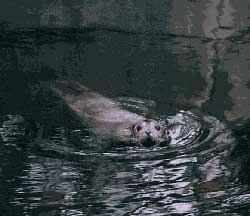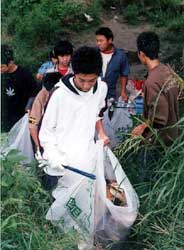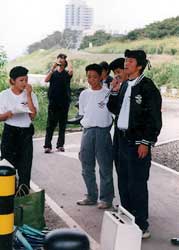MONTHLY NEWS Stray Seal Raises Questions About the Environment |
In August 2002 an unusual visitor
swam up the Tama River that flows between Tokyo and Kanagawa Prefectures:
a seal. The seal was seen swimming in the river and sunbathing on the
concrete banks. Named after the river, "Tama-chan" became
a national celebrity, attracting large crowds to the river. Experts
said Tama-chan probably got lost, since he is of a type that usually
lives in the Arctic Ocean. Tama-chan was later spotted in
Kanagawa's Tsurumi River, the third-most polluted river in Japan, and
people worried about whether he would be able to survive. That prompted
15-year-old Yuki Suzuki to launch a clean-up campaign to make rivers
more hospitable for all living creatures.
"After hearing about Tama-chan,
I visited the Tama River with my family. There was litter everywhere,"
he recalls. Yuki - who has been nicknamed Champion - is the leader of
the Eaglets, a group of kids that belongs
to the Iron Eagles, a volunteer organization
of young people aimed at creating a peaceful and safe society for all.
On September 14, more than 60 people - mostly kids - combed the banks of the Tama River and collected 50 bags full of garbage. They found cans, bottles, plastic, cigarettes studs, firecrackers, food wrappings, and even industrial waste like air conditioner pipes. On November 17 Yuki was decorated for his initiative with an award from a local nonprofit group, which commended him for inspiring kids around the nation to help keep rivers clean. Yuki says he hopes to conduct similar operations on a regular basis. Tama-chan has prompted kids nationwide to think more seriously about the environment, including sixth-graders at Hashiba Elementary School, located far from the Tama River in Osaka Prefecture. Tama-chan disappeared at one point in September, when typhoons battered the country, and everyone sighed in relief when he resurfaced. "At that point, I asked my students what we humans can do to help Tama-chan," remembers teacher Motoko Takamaru. "By the end of that day, students had created and put up posters at school, urging people to action."
Yuki Naka also issued a special class newsletter. "Seals may be smaller than humans,"he notes, "but all living things are equally alive. Tama-chan became famous, but we should try to save other animals as well." Makoto Ijuin, Hiroki Takeuchi, and others consulted the Internet for information. "Humans are polluting nature and pushing many animals to extinction. It's our fault. We should think again about waste and global warming," contends Hiroki. "We can start with things we can do right away, like cleaning parks," says Ai Matsumoto. Ai drew a manga cartoon in which her classmates build a fish robot to guide Tama-chan. Asuka Sano created a picture-story show with her classmates, and Yoshimi Ikegawa helped write a song. It goes: "Clean rivers and a clean ocean / I wish we could say to you / 'Welcome home, Tama-chan!'" The kids also thought about a difficult question: Should Tama-chan be captured and moved to a zoo or allowed to roam freely? The rivers are dirty, but a wild seal may not survive in captivity. Ayu Nakano hit the streets to conduct a survey and found that most people preferred capturing him. Tama-chan's future remains uncertain, but one thing is clear. He has caused many Japanese kids to think about environmental issues. Photos: (Top) Tama-chan the seal (Yokohama Flood Control Office); (second) Kids cleaning up the banks of the Tama River; (third) Yuki Suzuki speaking at the opening ceremony for the river clean-up (Alliance of Iron Eagles International); (bottom) Kids at Hashiba Elementary learning about Tama-chan (Hashiba Elementary School). |

|



